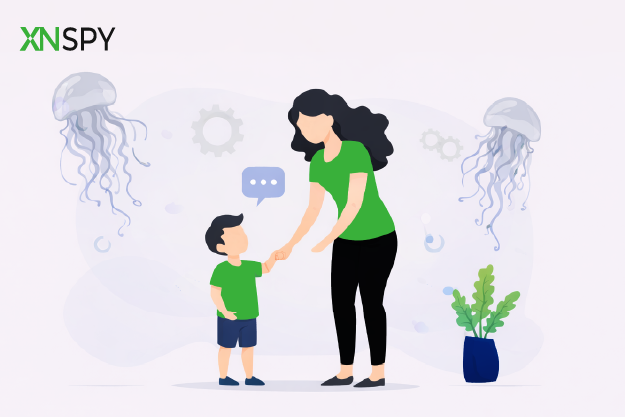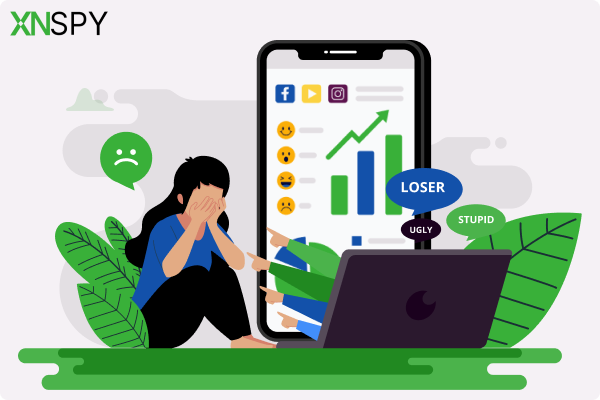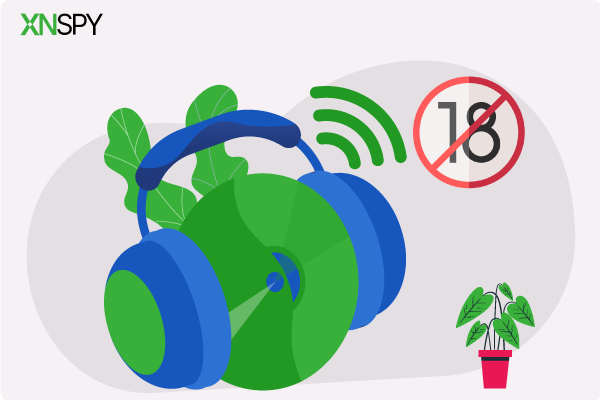The complete monitoring experience for your phone
Get XNSPY and start tracking calls, texts, multimedia, locations and more on any phone!
Get Started Now Live DemoEvery individual has a right to privacy. For kids, however, this rule may vary. As caregivers and guardians, giving their children privacy is the sole decision of the parent. Privacy is a hot topic these days and children growing up in the digital age may feel like privacy is their right.
Holed up in their rooms, children are spending more time on their phones, laptops, and tablets than ever before. This is a cause of concern for parents since they don’t know what their child is doing being closed doors. The internet provides access to a variety of content and people, including scammers, frauds, pornography, and inappropriate content. Obviously, when a child is left alone, parents are oblivious to the activities that their child may be involved in. Apart from this, parents may be worried that their teen is involved in substance abuse such as alcohol and drugs.
Given the limited experience of kids, it is difficult to comprehend the threats that lurk on the internet and in the real world. In this case, absolute privacy is bad for children. In fact, many parents argue that privacy should be treated as a privilege that is earned.
Although the argument may skew depending on who you’re talking to, there is mutual agreement amongst parents that children especially teens should work to earn the right to privacy. It shouldn’t be handed out to them.
No parent would want to snoop around their child’s room. Often parents feel a sense of shame and that they are going beyond their limit. They feel like they are breaking trust. However, parents often have to choose the lesser of two evils—having a reckless teenager or snooping around.
How does the concept of basic privacy differ from discretionary privacy
The concept of basic privacy and discretionary privacy differ in their scope and the level of control individuals have over their personal information.
Basic Privacy
Basic privacy refers to the fundamental right of individuals to have certain aspects of their lives protected from observation or interference. This includes privacy in situations where individuals are physically vulnerable, such as when changing clothes, showering, or using the restroom. Basic privacy is considered a human right and is essential for an individual’s safety and dignity[2].
Discretionary Privacy
Discretionary privacy, on the other hand, refers to the freedom to make choices about what information to share and with whom. It involves the ability to control access to personal information and to make decisions about one’s own life without interference from others. Discretionary privacy is often earned through demonstrating trustworthiness and responsible behavior, and it is typically more limited for teenagers than for adults[2].
In summary, basic privacy is a fundamental right that ensures individuals are protected from unwanted observation or interference in certain situations, while discretionary privacy is the freedom to make choices about personal information and to have control over one’s life.
Citations:
[1] https://www.w3.org/TR/privacy-principles/
[2] https://axis.org/resource/parent-guide-teen-privacy/
[3] https://www.ekransystem.com/en/blog/mac-vs-dac
[4] https://raisingchildren.net.au/pre-teens/communicating-relationships/family-relationships/privacy-trust-teen-years
[5] https://www.tworldminnesota.com/blog/our-privacy-policy-why-discretion-and-confidentiality-are-so-important
Factors to consider in giving a child privacy
While complete privacy should never be given to children, there are factors that you should consider in giving your children some amount of privacy. For example, let them hang out with their friends as long as they are coming home before curfew.
There are several factors that parents should consider when it comes to giving their kids privacy. First of all, parents need to consider the age of a child. When it comes to the digital realm, any kid whose age is less than 13 should not be allowed to have a social media account. In the case your child does have a social media account, you should know the password to it. This is important because parents should be able to monitor who there is in contact with. It will also help parents in guiding their child regarding digital etiquette. If you think that your kids are responsible, then you need to trust them and give them privacy for positive reinforcement.
The second factor in determining how much privacy their child deserves is by looking at the past record. If your child has shown responsible behavior, sticks to all the rules that you have laid out and performs well at school, you need to give them privacy if they demand it. However, for children to realize the consequences of actions, let them know why they’re getting the right to privacy. Also, let them know what actions could lead to revoking this freedom. In the case your child does not perform well at school, is known for reckless behavior, there is no point in giving your child privacy.
Teen resentment regarding privacy
Teens are young adults. Though they may fixate on the adult part and forget that they are young. They will, without a doubt, demand privacy at one point. Teenage is a time of change. Parents need to realize that as their kid grows, putting too many restrictions on them will suffocate them.
Teens may also grow to resent their parents for lack of privacy. Even if they are on their best behavior and a parent does not give them the privacy or freedom that they deserve, it may push them to become reckless.
Teens seek the approval of their parents. They want to be seen as independent and trustworthy individuals. Parents who stomp on their kid’s freedom make teens feel like they are kids. This makes them more withdrawn. This is why teens need to be given privacy in matters that they can handle. This article on Psychology Today perfectly encapsulates the conflict between teens and their parents, and what can be done to avoid it.
Parenting today vs. parenting 20 years ago
Parenting today is certainly not easy. With the advent of digital devices and the internet, parents are faced with challenges that were not there 20 years ago.
The online world is a different world, altogether. Parents have to be diligent in monitoring the activity of their child. Kids are glued to their phones these days and are more active on social media platforms.
With a changing digital landscape, parents need different tools to deal with their children. These devices were not available 20 years ago, so parents did not face the challenges that they face today.
Social media applications like Facebook, Instagram, and Snapchat influence the way people live their lives today. This can affect children negatively. This is why parents need to limit the time their kids spend online. However, teens argue that they should have privacy, whether online or in the real world. Too much privacy means that as a parent you have very little control over what your child does on the internet. Furthermore, you do not know who they are talking to and what activities they are involved in (for example cyberbullying). Parents find it easy to ask children below the age of 13 to check their phones. But teens are not so easily coerced.
Monitoring online activity is not easy since teens are more sensitive to maintaining their privacy on social media platforms. Worried parents may seem intrusive to these kids. There are many cell phone monitoring applications available out there. These applications come in handy for parents who suspect their child may be involved in some risky activity and for parents who want to keep their child safe.
Applications like Xnspy provide insights into the daily online activity of your child. You can monitor who they talk to, for how long, and about what. It allows parents to track the location of their child as well and much more.
How do schools balance privacy and safety for students
Schools balance privacy and safety for students by implementing measures that ensure both safety and privacy are protected. Here are some key strategies:
- Transparency: Clearly communicate any security measures, such as video monitoring or audio recording, to ensure students and staff are aware of what information is being collected and how it will be used[1][2][3].
- Data Privacy Compliance: Select technology solutions that adhere to privacy regulations like FERPA and COPPA to ensure the secure handling of sensitive student data[3].
- Elevated Security through Technology: Utilize solutions that conceal student IDs linked to educational records, have restricted access controls, and integrate advanced security elements like geofencing and image-based verification to enhance school safety[3].
- Anonymous Reporting Channels: Create anonymous reporting channels for students and staff to report safety concerns, promoting a culture of safety while respecting privacy[3].
- Regular Audits: Conduct regular security audits to identify and rectify vulnerabilities in both digital and physical security systems, ensuring the security practices and policies in place are effective[3].
- Privacy Education: Educate the school community about the importance of privacy, how data is used and protected, and the relevant laws and regulations[3].
- State Policies: Some states have adopted laws that aim to balance safety and student privacy, such as Colorado, Nebraska, and Utah, which provide guidelines for data privacy measures and threat assessment protocols[2].
- Effective Parent Engagement: Engage parents in safety procedures through a communication platform that provides real-time notifications and updates, simplifying access to information about school events and emergency drills[3].
- Efficient Filtering and Response: Use a communication system that filters through irrelevant noise during emergencies, ensuring only pertinent information reaches parents and staff, reducing panic and maintaining order[3].
- Commitment to Safety and Privacy: Leaders in education must commit to balancing school safety and student privacy, understanding the complexities and ethical considerations involved in creating a secure and respectful educational environment[3].
By implementing these strategies, schools can effectively balance the need for safety with the need for privacy, ensuring a secure and respectful learning environment for all students.
Citations:
[1] https://i2ctech.com/privacy-vs-safety-in-schools/
[2] https://www.ecs.org/keeping-schools-safe-while-protecting-students-privacy/
[3] https://www.pikmykid.com/balancing-school-safety-and-student-privacy/
[4] https://safesupportivelearning.ed.gov/resources/balancing-student-privacy-and-school-safety-guide-family-educational-rights-and-privacy
[5] https://www.commonsense.org/education/articles/are-schools-sacrificing-students-privacy-in-the-name-of-safety
How far is too far?
There are many cases where parents have extreme approaches in matters relating to privacy. The are some parents who allow their kids to do whatever they want without any restrictions. This means that these kids have too much freedom. Parents go to great lengths to fulfill each and every desire of their kids. Since children can’t assess what is safe for them and what is not, this can put them in dangerous situations. Moreover, it can lead children to test the limits of their freedom. By the time parents realize that their child has too much freedom, it is too late.
On the other hand, there are cases where parents give little freedom to their kids. This leads to becoming too dependent on their parents. It can make the child feel suffocated so that they are unable to grow as individuals. They don’t get the opportunity to discover where their interests lie. In the later stages of their lives, these kids may grow to resent their parents.
It goes without saying that there should be a balance. If parents want to raise healthy individuals, there needs to be control as well as freedom for kids to thrive. Snooping around at the cost of your child’s trust is not the solution. In fact, parents who do this behind their teen’s back may be doing more harm than good.
This is why if you suspect your teen of doing something you don’t approve of the first step you should take is by asking. Simply talk to them. However, in some cases, where a child is already involved in risky behavior, they may go to extreme lengths to hide the truth. This is not because they want to keep their life private, but because it may be met with disapproval by the parents leading to punishment.
Parents should invest in developing a bond where their child feels secure in sharing things with their parents without feeling like they are being judged. A child should look for safety in a parent where they could confide even if they made a mistake. Being in fear of their parents may lead children away from their parents.
As a parent, you are the best judge in deciding how much privacy your kid should get without it affecting your relation with your child. As a kid grows up, the ultimate goal of a parent is to make them independent and responsible adults.


